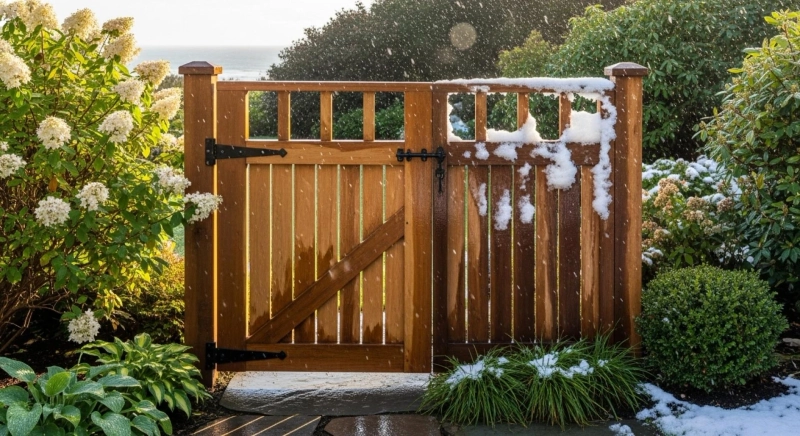Introduction
When choosing the right wood for garden gates, one important factor that often gets overlooked is climate suitability. The type of wood that works well in dry, sunny areas may not perform the same way in humid or coastal regions. A wooden gate is more than just an entryway it’s a statement piece for your garden, a protective barrier for your property, and a long-term investment. By selecting the right wood for your climate, you can ensure durability, beauty, and minimal maintenance for years to come.

In this guide, we’ll explore different types of wood for garden gates, how they respond to varying weather conditions, and which options are best suited for your region.
Why Climate Matters for Wooden Garden Gates
Wood is a natural material that reacts to its surroundings. Heat, moisture, humidity, and cold all impact how wood behaves over time.
- In hot, dry climates – Wood tends to crack or warp due to lack of moisture.
- In humid or coastal climates – Moisture can lead to rot, swelling, and mold growth.
- In cold, snowy areas – Constant freezing and thawing cycles can cause wood to split.
This makes it essential to match your choice of wood for garden gates with the local weather patterns.
Factors to Consider Before Choosing Wood
Before diving into the best wood types for each climate, here are a few universal factors to think about:
1. Durability
Some woods naturally resist decay and insects, while others need treatments or sealants.
2. Maintenance
Consider how much time you’re willing to spend on upkeep. Some woods need frequent staining, while others perform well with minimal care.
3. Cost
Your budget will also determine which type of wood makes sense. Exotic hardwoods may last longer but come at a higher price.
4. Aesthetics
Grain, color, and texture differ from one type of wood to another. Your choice should also complement your home and garden style.
Best Woods for Different Climates
🌞 1. Hot & Dry Climates – Cedar and Redwood
Cedar and redwood are excellent choices for areas with scorching summers and little rain.
- Cedar contains natural oils that resist rot and insects. It also stays relatively stable in heat.
- Redwood is highly durable, less likely to crack, and has a beautiful reddish tone that adds elegance to garden gates.
🔑 Tip: Apply UV-resistant finishes to prevent color fading.
🌊 2. Humid or Coastal Climates – Teak and Ipe
If you live near the coast or in regions with high humidity, water resistance becomes a priority.
- Teak is one of the most water-resistant woods available, often used in boat building. It withstands salty air and resists decay.
- Ipe (also known as Brazilian walnut) is extremely dense, long-lasting, and naturally resists rot and termites.
🔑 Tip: Regular oiling enhances their resistance and keeps them looking new.
❄️ 3. Cold & Snowy Climates – Oak and Douglas Fir
For areas with freezing winters, you’ll need wood that can handle expansion and contraction without splitting.
- Oak is very strong and can tolerate harsh winters with proper sealing.
- Douglas Fir is affordable, sturdy, and performs well against snow when treated with protective finishes.
🔑 Tip: Reapply waterproof sealants before each winter season.
🌦️ 4. Moderate or Mixed Climates – Pine and Cypress
For regions where the weather is mild or a mix of conditions, softer woods may also be suitable.
- Pine is budget-friendly and versatile but requires pressure treatment to resist rot.
- Cypress contains natural oils that help it withstand moderate weather changes and resist insects.
🔑 Tip: Use pressure-treated pine for better longevity in mixed climates.
How to Protect Your Wooden Garden Gate
Regardless of the type of wood for garden gates you choose, proper care can extend its lifespan.
Regular Maintenance
- Clean dirt and mildew with mild soap and water.
- Inspect hinges and hardware for rust.
Sealing and Staining
- Apply wood sealant or stain every 1–2 years.
- Use UV-protection finishes for sunny climates.
Proper Installation
- Avoid direct contact with soil to prevent rot.
- Ensure good drainage around the gate to reduce moisture exposure.
Pros and Cons of Popular Woods
Wood TypeBest ForProsConsCedarHot, Dry ClimatesLightweight, insect-resistantCan fade without UV protectionRedwoodHot, Dry ClimatesDurable, attractive colorExpensiveTeakCoastal, HumidHighly water-resistantPriceyIpeCoastal, HumidExtremely durableVery heavy, costlyOakCold ClimatesStrong, long-lastingNeeds sealingDouglas FirCold ClimatesAffordable, sturdyRequires treatmentPineMixed ClimatesBudget-friendlyNeeds pressure treatmentCypressMixed ClimatesNaturally rot-resistantLimited availability in some areas
Related Keywords You Can Use
- Best wood for outdoor gates
- Weather-resistant garden gates
- Durable wood fencing options
- Wooden gates for coastal areas
- Low-maintenance garden gates
FAQs
Q1: What is the longest-lasting wood for garden gates?
Teak and Ipe are among the most durable, lasting decades with proper care.
Q2: Is cedar better than pine for garden gates?
Yes, cedar is naturally rot-resistant, while pine usually requires pressure treatment.
Q3: How often should I seal my wooden garden gate?
Every 1–2 years, depending on climate exposure.
Q4: Can wooden garden gates withstand coastal weather?
Yes, but you’ll need hardwoods like teak or ipe for the best performance.
Q5: What’s the most affordable option for garden gates?
Pressure-treated pine is one of the most budget-friendly choices.
Conclusion
Choosing the right wood for garden gates depends largely on your local climate. While cedar and redwood thrive in hot areas, teak and ipe shine in coastal conditions. Oak and fir perform well in snowy climates, while pine and cypress work in moderate regions.
With the right choice of wood and consistent maintenance, your garden gate can remain strong, stylish, and durable for decades.



